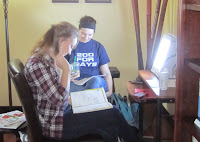Light Therapy for Children and Teens on the Autism Spectrum

"Has anyone heard of phototherapy for helping a depressed autistic child get through the winter months and improve his/her mood in general?" Phototherapy (also called “light therapy”), which involves exposure to artificial light, is quickly becoming a popular way to treat seasonal affective disorder (SAD) in children on the autism spectrum. SAD is a type of depression that occurs at a certain time each year, usually in the fall or winter. During phototherapy, your child sits near a device called a light box. The box gives off bright light that mimics natural outdoor light. Phototherapy is thought to affect brain chemicals linked to mood, easing SAD symptoms. Using a light box may also help with other types of depression, sleep disorders and other conditions. You may want to try phototherapy on your child for a number of reasons: If the child is on medication for depression, it may allow him or her to take a lower dose of antidepressant It's a proven treatment for

